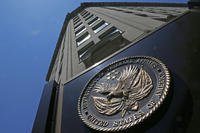Haitian political leaders are accusing the political party of former President Jean-Bertrand Aristide and its allies of trying to hijack the country's shaky transition process -- and they want the Caribbean Community to step in.
In a three-page letter requesting the intervention of the 15-member regional Caribbean Community bloc known as CARICOM, the political leaders say that the Transitional Presidential Council, tasked with restoring security and political stability in crisis--wracked Haiti, has been taking "unilateral decisions" that violate the spirit of an April political agreement that established the transition.
The leaders represent four of the seven sectors that have voting rights on the nine-member ruling council: December 21 Agreement, Collective of political parties of January 30, EDE-RED political coalition and Platform Pitit Desalin. In a separate note, Historique Compromis, which is part of the EDE-RED, says it did not sign. Also not a party to the letter are the private sector and the Montana Accord. The Montana has publicly denounced the council and its administration of the country while also calling for the resignation of three presidential council members named in a bank bribery scandal.
The request for Caribbean leaders to intervene is the latest indication that the transition, composed of a cross-section of political parties and civil society organizations that are supposed to be taking the country to its first elections since 2016, is in trouble and perhaps even on life support after being rocked by several scandals.
The current controversy threatening to destabilize the delicate political balance has to do with several high-stakes decisions taken under the leadership of current council president Leslie Voltaire. Last month Voltaire, with the help of the body's voting members, including the three named in a bank bribery scandal, led the charge to dismiss Prime Minister Garry Conille, and last week named several new personalities to the country's foreign embassies and consulates.
The moves, along with the decision to replace Conille with businessman Alix Didier Fils-Aime, the political leaders say, are set up "to take control of the transitional government and to reproduce at all cost two decades of failure in power." In other words, to put Fanmi Lavalas and its allies back in power.
The leaders say that at a time when thousands of citizens have been driven out of their neighborhoods just in the month of November, and scores of lives have been lost in two back-to-back massacres this week and government ministers, Supreme Court Justices and members of the army's High Command cannot access their offices in downtown Port-au-Prince because of brutal gangs, the presidential council and government appointed "their relatives to diplomatic posts."
They are concerned, they say, about the socio-political situation, and the decisions violate the political consensus defined in March and in the April political agreement.
The request for Caribbean leaders to intervene underscore the deepening turmoil and instability in Haiti, where gangs have been gaining inroads despite the presence of the Kenya-led Multinational Security Support mission and public confidence in the transition has been eroding.
Fanmi Lavalas has not addressed the letter to CARICOM. But in a separate communique on Thursday, the party accused the ruling presidential council and government of failing to make good on its promises to bring change.
"Insecurity has worsened. Massacres upon massacres, kidnappings, corruption, poverty, and violence cause everyone to live in anguish," the statement said. "Promises have turned into despair with more than 6 million people hungry and 1 million forced to leave their homes and live on the streets."
The presidential council and government, Fanmi Lavalas said, "have shown no sensitivity or capacity to respond to the urgent needs of the population."
Whether Fanmi Lavalas and its own representative on the council, Voltaire, are really at odds, is unclear. But what has been clear now for some months is that the sectors that named representatives to the panel to lead Haiti's transition, haven't been in control of many of their reps for some time. This has been made abundantly clear with the three council members -- Louis Gérald Gilles, Emmanuel Vertilaire and Augustin -- who are accused of demanding the equivalent of $758,000 from the director of a government-owned bank for him to keep his job.
Despite calls by their sectors to resign from the council, the men have refused, saying they are innocent. This week, they also each refused to appear before an investigative judge looking into the allegations.
Backed by Washington, Haiti's political transition was forged in March when U.S. Secretary of State Antony Blinken flew to Jamaica to join leaders of CARICOM, France, Canada, the United Nations and others to figure out a solution to the Haitian crisis as gangs launched coordinated attacks across Port-au-Prince. The power-sharing agreement was meant to stabilize the situation on the ground and create political trust to restore security and move toward elections.
The finalized agreement charged a transitional council with naming a new prime minister to replace outgoing leader Ariel Henry after he was forced to resign by the U.S. and CARICOM, and to prepare the country for the arrival of a multinational security support mission led by Kenya. The final task was the organization of elections.
But now with mistrust seeping in, and public confidence eroding in the council eroding and threatening to shake the political balance, it remains to be seen if Caribbean leaders, who have agreed to a video conference on Monday afternoon, can salvage Haiti's transition and help get the country back on the road to organizing free and fair elections.
© 2024 Miami Herald.
Visit miamiherald.com.
Distributed by Tribune Content Agency, LLC.









